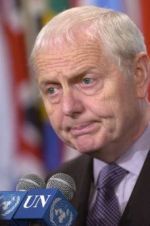UK suspends pushing for Sudan sanctions, time for diplomacy
April 5, 2007 (UNITED NATIONS) — The U.K. will hold off pushing for new sanctions against Sudan to allow time for political efforts to bring all parties in its conflict-wracked Darfur region to the peace table, the U.K.’s U.N. envoy said.
 But Ambassador Emyr Jones Parry warned Wednesday that “if there isn’t significant progress very soon, then we will be tabling this resolution” proposing new sanctions.
But Ambassador Emyr Jones Parry warned Wednesday that “if there isn’t significant progress very soon, then we will be tabling this resolution” proposing new sanctions.
On Monday, Secretary-General Ban Ki-moon urged the U.S. and U.K. to delay a push for tougher sanctions against Sudan, saying the U.N. needed more time to promote political negotiations and to persuade the country to accept the deployment of U.N. peacekeepers in Darfur.
The Security Council imposed sanctions on four men involved in the Darfur conflict in April 2006, the first-ever such penalties imposed in the violence. The four, including a former air force commander, a janjaweed chief and two rebel commanders – are accused of helping orchestrate and carry out killings, rape and other rights abuses in Darfur.
The council adopted a resolution in March 2005 authorizing an asset freeze and travel ban on individuals who defy peace efforts, violate international human rights law, or are responsible for military overflights in Darfur.
Sudanese President Omar al-Bashir’s refusal to accept U.N. troops – along with the relentless bloodshed in Darfur – have prompted the U.S. and U.K. to call for tougher action against Sudan, where four years of conflict have killed 200,000 people and chased more than 2.5 million people from their homes.
Al-Bashir’s government is accused of backing Arab janjaweed militiamen blamed for widespread atrocities against ethnic African civilians.
Jones Parry said the new resolution will increase the number of individuals subject to sanctions, look at an arms embargo, consider monitoring air movements over Darfur to determine who is breaking previous council resolutions, and discuss whether companies, organizations and other entities should be subject to sanctions.
“The resolution will be one that is not targeted at the general populous, but will be specific and intended to get at those in positions of authority to persuade them to be reasonable,” he said.
The secretary-general said he hoped to send U.N. experts to Ethiopia’s capital next week to follow up on an agreement he reached last week with al-Bashir to work out U.N. support for the AU force.
“My position is that, before we talk about sanctions, let me have some more political space to deal with this dialogue” with the Sudanese government, Ban told reporters after returning from a tour in the Middle East.
At the same time, Ban’s special special envoy for Darfur, Jan Eliasson, and his AU counterpart, Salim Ahmed Salim, are trying to re-energize the peace process and get previously reticent rebel groups to negotiate a truce.
“The problem with Sudan is that we have not consistently had the positive support from those who are the key actors,” Jones Parry said. “That applies partly to the rebels, especially now, but it applies consistently to president Bashir.”
“If it becomes clear that in the window now available for progress on the political track – that we’re not making that progress – then the … draft resolution will emerge,” he said.
“We’re holding off partly for technical reasons to make sure we get everything lined up, but also to give the space for the political track to make progress,” Jones Parry said.
(AP)
